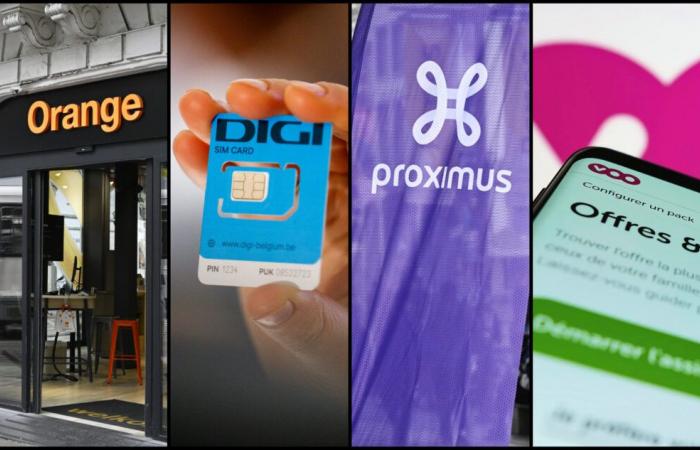Mosquito Montage: images ©Belga Image
For several days, DIGI has been running a communications campaign that many are jealous of. And for good reason, she never stops making headlines. Its €5 subscriptions for services that seem on par with other brands… Obviously, something must be wrong. Well, for the moment, nothing negative on the horizon for the consumer. This is what must necessarily worry other operators in the country, who find themselves in an uncomfortable situation following the arrival of the company of Romanian origin on the Belgian market. A question is nagging at people’s minds: will consumers go for these attractive offers, to the detriment of current major operators?
Market prices upset?
The Orange group communicated this Thursday morning that “Hey!” lowered its prices. Even if they don’t address it in their communication, it’s obvious that these reductions are a response to the arrival of the Romanian company on the market. “Large groups which have smaller brands like Hey! or Scarlet (Proximus), will adapt. Especially since it has been a while since the prices have been changed in the two brands we have just mentioned. Operators will use them to compete directly with DIGI. I think they were waiting to see what this new competition offered“, asks Antoine Destrument, telecoms specialist at Selectra who gives his advice on the CallMePower.be platform.
But for traditional operators, it’s quite the opposite. “This is quite unusual, because major operators like Orange, Proximus, VOO, etc. announced a price increase in January. They knew DIGI was coming, so it was a bit surprising.” And indeed, while Hey! reduced its prices, Orange sent an email this Thursday morning to some of its customers, to remind them of the price increases, already announced a few months ago. For GSM subscriptions, they range between 40 cents and €1.40, whether in a pack or individually.
Different costs
The big brands are not likely to follow the reduction movement. “There will be no net alignment effect, that has never happened because I think there are several types of consumers, clients, and profiles. They certainly have no interest in getting into a price war because they must defend their margins and their business. They are faced with costs that they must make profitable because they are the first to have developed and invested in the network. These are fixed costs that must be able to be profitable over the longer term, and which new players do not necessarily have. All that comes into play. I don’t expect there to really be a big revolution, but they will take it into account to have more attractive offers or at least have a slightly more defensive technique”, analyzes Nicolas Neysen, professor of digital strategy at HEC Liège.
The question of increasing prices is also emerging among certain consumers, who would eventually like to move towards DIGI. “There may be difficulty in readability in the offers. We can say to ourselves: ok, this is the offer they are offering now, will it still be the same in six months, will they still be there in a year? There are many questions that may arise“. The Romanian company had communicated that these were not call prices, but it remains to be seen whether the future will confirm this…
Operators in danger?
It is still early to be able to envisage the follow-up that the operator will give to its network, and the services that will be offered. “For now, I think it will have a pretty big effect. But I don’t know if it’s that worrying for other operators. They must not be happy, obviously. But for the moment, since DIGI only really offers mobile and a little fiber, the network is very limited. A lot of people aren’t going to want to sign up for that because they’re going to want to combine an Internet subscription with a phone subscription. Consumers may not change right away. But it might come“, explains Antoine Destrument.
The Belgian is loyal
Despite marketing based on low prices, it is not certain that Belgians change operators so easily. “It’s a bit like a poker game. The question is: to what extent do we consider that consumers, current customers, will be tempted? There will of course be some for whom the price aspect is fundamental and who consider that it is a main criterion of choice, they will therefore change operator. But these are people used to comparing, looking for the lowest prices. This does not represent the entire market. There are other variables on which we can judge the quality of a service. I am thinking in particular of consumer service, after-sales service, troubleshooting, network stability, etc.“, adds Nicolas Neysen. For many people, the price criterion is not enough in itself as an argument for changing operators, especially in our country…”The Belgian is quite faithful to his telecom contracts, normally. It changes very few operators“, concludes Antoine Destrument.
Will the consumer leave or not? It is too early to say. But DIGI can really revolutionize the Belgian operator market, as has been done in other countries. One thing is certain, it is an upheaval which will leave its mark because the new operator has good contact with customers. So who could stand in his way?






